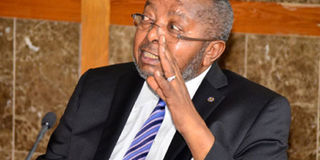Uganda in urgent need of national payment system, says central bank

Mr Emmanuel Tumusiime Mutebile, the Bank of Uganda governor. FILE PHOTO
What you need to know:
- The Central Bank will after the consultative phase institute a law under which payment service providers, operators of payment systems and payment instruments are licenced.
- Mr Moses Kaggwa, the Ministry of Finance acting director economic affairs, said the National Payment System is critical for the working, functioning of financial system and the economy.
Kampala. Bank of Uganda has said the country urgently needs a comprehensive National Payment System to licence and regulate new payment platforms in the financial markets.
Payment systems have evolved in the last five years precipitated by the rapid growth in the electronic payment space.
However, about 76 per cent of transactions, according to the Central Bank, are made through cash notwithstanding the entry of electronic payment platforms such as mobile money and mobile banking.
In a speech delivered by Mr Elliot Mwebya, the Central Bank executive director information technology, during a consultative meeting on the draft National Payment System Bill in Kampala, Mr Emmanuel Tumusiime Mutebile, the Bank of Uganda governor, said just like other approved payment systems in the region, such as East African Payments System and the Comesa Regional Payments and Settlement System, Uganda needs a harmonised system to ease payments.
“… a comprehensive National Payment System to provide an oversight framework for payment service providers, operators and instruments is urgently required,” Mr Mutebile said, explaining that the Bank of Uganda Act 2,000 and the Financial Institution Act 2004 are either silent or have limitations on the regulation and supervisions of Payment Systems.
The National Payment System is currently undergoing a review before it is sent to the Finance Ministry for consideration and further adjustment.
Uganda’s money market, according to Mr Mutebile, has recently experienced an upsurge in privately operated payment systems such as debit and credit cards, Automated Teller Machines and mobile payment systems, which call for proper regulation and harmonisation.
The Central Bank, while unveiling the new National Payment System about two weeks ago, said they were leveraging on the fast-rated growth in technology to improve electronic payment platforms with the view of reducing cash payments.
The National Payment System, according to the Central Bank, will seek to streamline regulation, a key ingredient that is currently missing in the payments system.
The system will, for instance, separate and licence new payment operators as well as check for national and international interoperability.
According to the Central Bank, the National Payment System, is one of the principal components of a country’s monetary system and is therefore crucial in the direction of a country’s economic development.
In December 2017, Mr Mutebile said, Cabinet had approved the policy and principles for the creation of the National Payment System, Payment Service Providers and Payment Instruments.
This was followed by another approval in February to amend sections of the Bank of Uganda Act to empower the Central Bank to regulate and oversee the payments system.
“The draft Bank of Uganda Amendment Bill is being reviewed by a select technical team.
The passing of the two draft bills will greatly enhance BoU’s supervisory oversight on the National Payment Systems,” he said.
Mr Moses Kaggwa, the Ministry of Finance acting director economic affairs, said the National Payment System is critical for the working, functioning of financial system and the economy.
“We have taken long without having legislation on National Payment System because we wanted to understand technological development. By developing the National Payment System we don’t want to kill innovations such as Fin-tech and cryptocurrencies, among others that are coming up in the financial system,” he said.
The National Payment System will provide orderliness in money markets and eliminate fraud-prone payment systems.
It will also create clear and pave way for better taxation where it may apply.
Reducing cash payments
The Central Bank will after the consultative phase institute a law under which payment service providers, operators of payment systems and payment instruments are licenced. The National Payment System, is part of the Central Bank’s strategic plan to reduce the use of paper money payments by 2022.
According to data from Bank of Uganda, between 75 per cent and 85 per cent of retail transactions in Uganda are made using cash.




